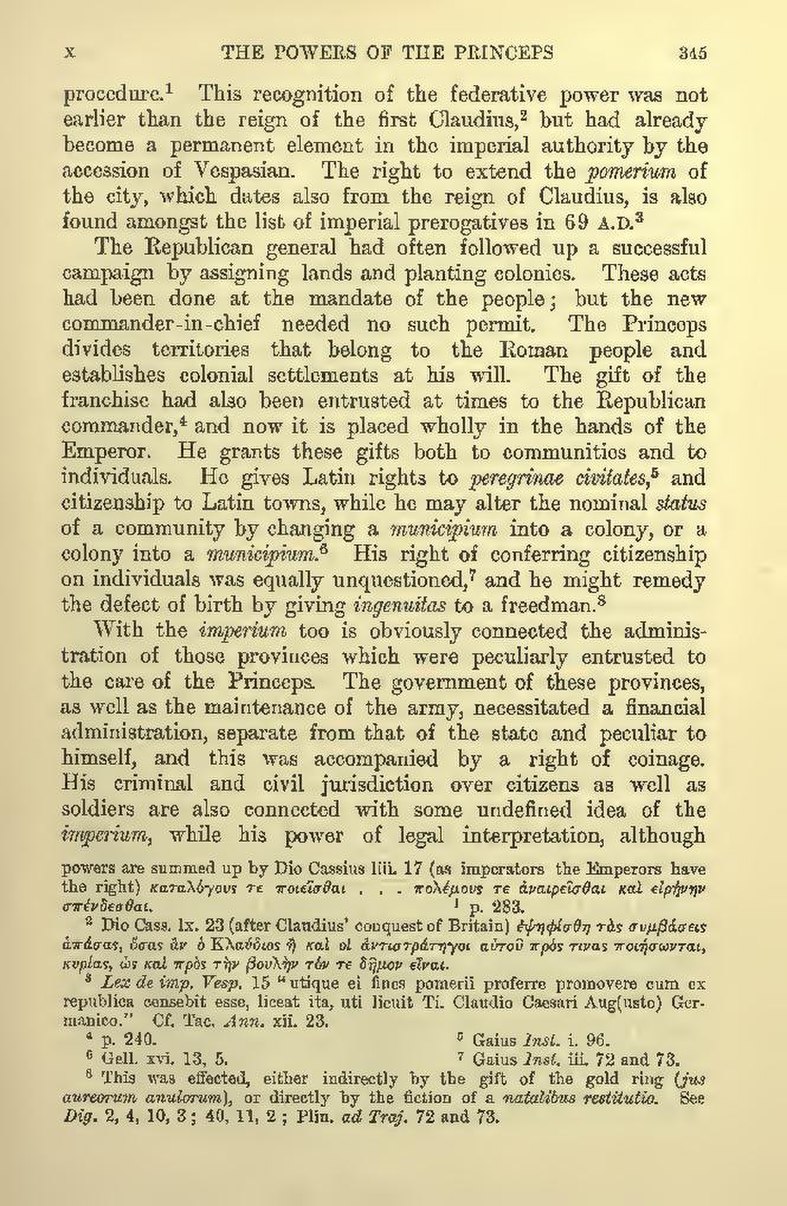procedure.[1] This recognition of the federative power was not earlier than the reign of the first Claudius,[2] but had already become a permanent element in the imperial authority by the accession of Vespasian. The right to extend the pomerium of the city, which dates also from the reign of Claudius, is also found amongst the list of imperial prerogatives in 69 A.D.[3]
The Republican general had often followed up a successful campaign by assigning lands and planting colonies. These acts had been done at the mandate of the people; but the new commander-in-chief needed no such permit. The Princeps divides territories that belong to the Roman people and establishes colonial settlements at his will. The gift of the franchise had also been entrusted at times to the Republican commander,[4] and now it is placed wholly in the hands of the Emperor. He grants these gifts both to communities and to individuals. He gives Latin rights to peregrinae civitates,[5] and citizenship to Latin towns, while he may alter the nominal status of a community by changing a municipium into a colony, or a colony into a municipium.[6] His right of conferring citizenship on individuals was equally unquestioned,[7] and he might remedy the defect of birth by giving ingenuitas to a freedman.[8]
With the imperium too is obviously connected the administration of those provinces which were peculiarly entrusted to the care of the Princeps. The government of these provinces, as well as the maintenance of the army, necessitated a financial administration, separate from that of the state and peculiar to himself, and this was accompanied by a right of coinage. His criminal and civil jurisdiction over citizens as well as soldiers are also connected with some undefined idea of the imperium, while his power of legal interpretation, although
- [Footnote: powers are summed up by Dio Cassius liii. 17 (as imperators the Emperors have
the right) [Greek: katalogous te poieisthai . . . polemous te anaireisthai kai eirênên spendesthai.]].]
- ↑ p. 283.
- ↑ Dio Cass. lx. 23 (after Claudius' conquest of Britain) [Greek: epsêphisthê tas symbaseis hapasas, hosas an ho Klaudios ê kai hoi antistratêgoi auton pros tinas poiêsôntai, kyrias, hôs kai pros tên boulên ton te dêmon einai
- ↑ Lex de imp. Vesp. 15 "utique ei fines pomerii proferre promovere cum ex republica censebit esse, liceat ita, uti licuit Ti. Claudio Caesari Aug(usto) Germanico." Cf. Tac. Ann. xii. 23.
- ↑ p. 240.
- ↑ Gaius Inst. i. 96.
- ↑ Gell. xvi. 13, 5.
- ↑ Gaius Inst. iii. 72 and 73.
- ↑ This was effected, either indirectly by the gift of the gold ring (jus aureorum anulorum), or directly by the fiction of a natalibus restitutio. See Dig. 2, 4, 10, 3; 40, 11, 2; Plin. ad Traj. 72 and 73.
